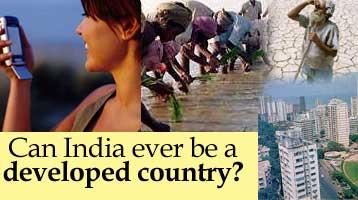Home > News > Diary
Prashant Pimpalekar |
August 16, 2004 12:30 IST

During my seven years in the US, I used to read every 'feel-good' report about India with great pride. There were articles and articles about how India is riding the wave of a telecom revolution, how it has become world's choice back-office destination, how infrastructure had improved, how the middle class is swelling, how it is all set to be another super power etc, etc.
Circa 2004. I return home with moderate expectations. To my great shock and dismay, nothing has changed! It is status quo 1997!
In the month of May, people were dying because of a sweltering heat wave. Hundreds of thousands of poor villagers traversed miles to get drinking water.
The monsoon first played truant in June and July and many farmers committed suicide in Andhra Pradesh and Maharashtra. When it began, it made up for the delay with a vengeance and wreaked havoc in Bihar (now, people drowned in the flood waters as ministers took aerial surveys).
One spell of heavy rains and the Mumbai-Pune Expressway was full of potholes (it does not need a genius to figure out the sad plight of the interior roads).
Electricity plays hide-and-seek as usual in Bangalore, Pune and Hyderabad (touted as India's Silicon Valleys) and in many other places all over India.
Tap water is so filthy that one is forced to drink bottled water (though one is not sure how safe that is).
Pollution, which has reached record-breaking heights, is causing serious health problems.
Traffic jams are the order of the day.
The news of militants killing people in Kashmir is de rigueur in the news pages.
I don't think I need to say more.
Instead, I would like to pose a question: Wasn't all this happening in 1997 (or, for that matter, in 1947)? So, what's changed?
Oh yes, some things have.
Instead of Ambassadors, Fiats and Maruti Suzukis, Santros, Qualises, Accords, Ikons, Corollas and Mercedes are jostling for space on the same potholed roads (even as they emit tons and tons of pollutants)!
Almost everyone sports a snazzy mobile phone.
Malls are very much a part of the metro culture.
There is a mad rush for designer flats and row houses.
Television and print media are vying to out-do each other in 'yellow journalism.'
'Ladies bars' are no longer restricted to the metros.
The number of divorces is on the rise.
Is this growth?
A few lucky individuals benefited from IT (call it ITeS or ICE if you like). That does not mean the whole of India is progressing.
With due respect to the burgeoning IT and BPO industry, its benefits have not percolated to the masses. It is restricted to a few urban centres and the English speaking middle-class.
What about the hundreds of thousands of Indians living in interior India? What about Sanjay from Bhusaval? What are the employment opportunities available to him? Will he have to head for Mumbai and be part of that living hell -- its slums? No wonder crimes like looting and cheating are on the rise.
This may sound clichéd but the gap between the 'haves' and 'have-nots' has widened even more. Not that it bothers the government. The NDA, which tom-tommed the 'feel good' factor to the drought-struck masses, got a resounding slap in the face. Besides declaring a sop of free electricity for farmers, the present government has done nothing till date.
The new breed of communication-savvy politicians is, like the corporate honchos, talking about making India a superpower by 2040 (I remember Vision 2020 being tom-tommed with equal enthusiasm some years ago). How on earth is that going to happen? Just by talking about it?
Where is the long-term strategic plan to create millions of jobs every year? What measures are we taking to tackle the omnipresent demon of corruption? What are our chances of getting MPs/ministers with no criminal record? What is our plan to achieve decentralised, uniform industrial development spread across the country? How are we going to control the ticking bomb of population? What are we doing to prevent female infanticide? What are the measures taken to achieve 100 percent literacy? What is the road map for providing potable tap water to the masses? When will we have world-class infrastructure? When will we have interruption-free electricity? When will any political party fulfil the promises made in their manifesto?
If we still haven't fulfilled the basic need of bijli, sadak, pani (and are ranked so low in the list of developing countries), how can we ever become a developed nation? If we haven't achieved this in the past 57 years, on what basis can we say we will do it in the next 35 years?
The realistic answer to 'Can India ever be a developed country?' is a bitter NO. Just as the answer to the other big question mark, 'Can India ever win a gold medal in Olympic athletic events?' is another resounding no.
But the heart doesn't want to accept that. Somewhere, deep down, I still have a faint hope that India will become a developed nation -- and win a gold medal in athletics at the Olympics -- in my lifetime (for the record, I'm in my late thirties).
Image: Rahil Shaikh